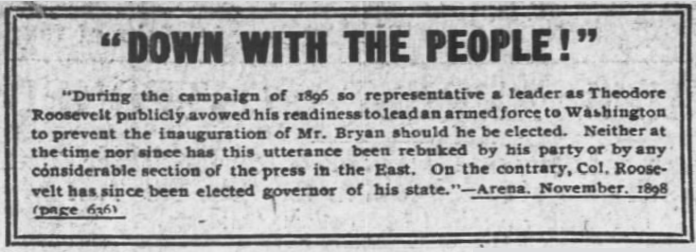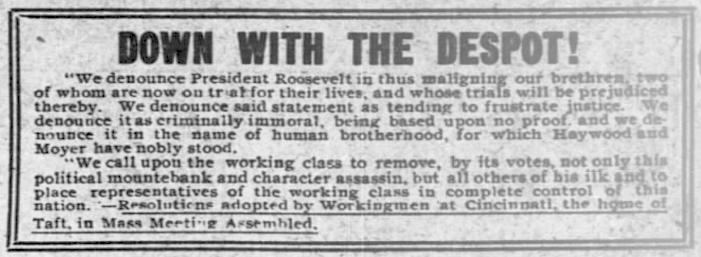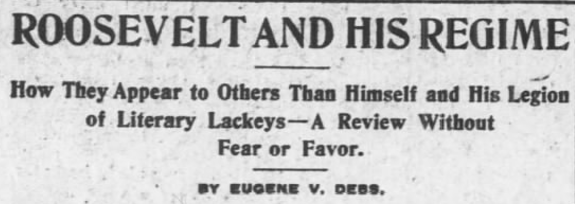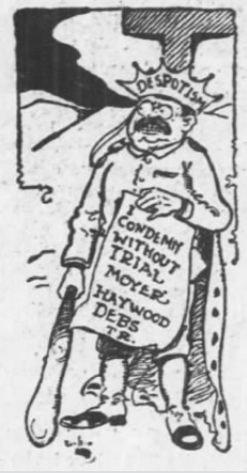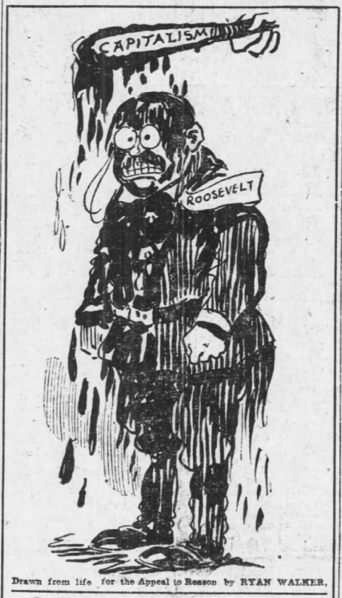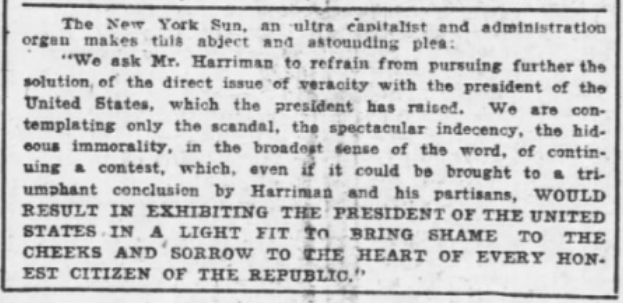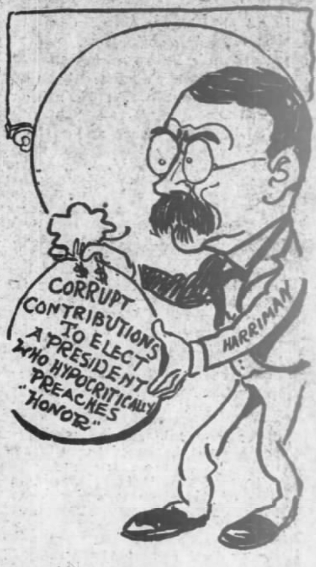A thousand times rather would I be
one of those men in Ada county jail
than Theodore Roosevelt in
the White House at Washington.
-Eugene Victor Debs
Hellraisers Journal, Wednesday April 24, 1907
From the Appeal to Reason: Eugene Debs on Theodore Roosevelt
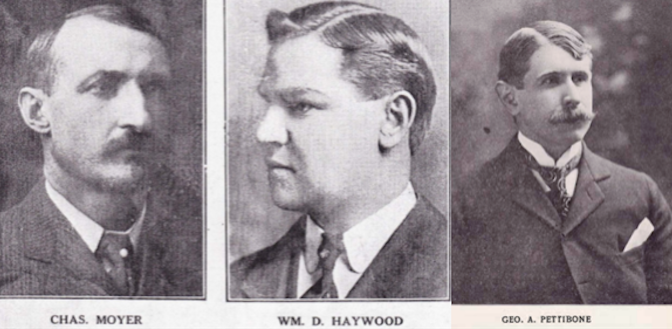
Eugene Debs, who, along with Bill Haywood and Charles Moyer, has been adjudged an “Undesirable Citizen” by President Theodore Roosevelt, had a few words to say upon the subject in this week’s edition of the Appeal to Reason:
When Roosevelt stepped out of the White House and called Moyer, Haywood and Pettibone murderers, men he had never seen and did not know; men who had never been tried, never convicted and whom every law of the land presumed innocent until proven guilty, he fell a million miles beneath where Lincoln stood, and there he grovels today with his political crimes, one after another, finding him out and pointing at him their accusing fingers.
No president of the United States has ever descended to such depths as has Roosevelt to serve his law-defying and crime-inciting masters.
The act is simply scandalous and without a parallel in American history.
What right has Theodore Roosevelt to prejudge American citizens, pronounce their guilt and hand them over to the hangman? In a pettifogging lawyer such an act would be infamous; in the president of the nation it becomes monstrous and staggers belief.
All that Roosevelt knows about Moyer, Haywood and Pettibone he knows from his friends, their kidnapers.
The millions of working men and women, embracing practically ever labor union in America, count for nothing with him. He is not now standing for their votes. He is fulfilling his obligation to the gentlemen (!) who put up the coin that elected him; paying off the mortgage they hold upon his administration.
Theodore Roosevelt is swift to brand other men who even venture to disagree with him as liars. He, according to himself, is immaculate and infallible.
The greatest liar is he who sees only liars in others.
When Theodore Roosevelt, president of the United States, denounced Charles Moyer, William Haywood and George Pettibone as murderers, he uttered a lie as black and damnable, a calumny as foul and atrocious as ever issued from a human throat. The men he thus traduced and vilified, sitting in their prison cells for having dutifully served their fellow-workers and having spurned the bribes of their masters, transcend immeasurably the man in the White House, who, with the cruel malevolence of a barbarian, has pronounced their doom.
A thousand times rather would I be one of those men in Ada county jail than Theodore Roosevelt in the White House at Washington.
Full text of “Roosevelt and His Regime” by Eugene V. Debs:
———-
———-
———-
The only time in my life I ever saw Theodore Roosevelt was years before he became president of the United States. I was aboard of a train in the far west, where Roosevelt was then said to be following ranch life, and as he and several companions in cowboy costume entered the car at a station stop, he was pointed out to me. I did not like him. The years since have not altered that feeling of aversion except to accentuate it.
I have since seen the nation mad with hero worship over this man Roosevelt, but I have not been impressed by it. Very “great” men sometimes shrivel into very small ones and finally vanish in oblivion in the short space of a single generation.
The American people are more idolatrous than any “heathen” nation on earth. They worship their popular “heroes,” while they last, with passionate frenzy, and with equal madness do they hunt down the sane “fools” who vainly try to teach them sense. Theodore Roosevelt and George Dewey as “heroes” and Wendell Phillips and John Brown as “fools” are notable illustrations. American history is filled with them.
But my personal dislike of the cowboy in imitation who has since become president, however justifiable, would scarcely warrant a public attack upon his official character, and this review, being of such a nature, is inspired, as will appear, by entirely different motives.
There are those, and they constitute a great majority of the American people, who stand in awe of their president, supposedly their servant, but in fact their master; they speak of him with a kind of reverential adulation as a lordly personage, a superior being to be looked up to and worshiped rather than a fellowman to be respected and loved. There are others who betray equal ignorance in a more vulgar fashion by coarse tirades for which there is often as little excuse as there is for the extreme adulation.
Regarding the president of the United States, as I do, simply as a citizen and fellowman, the same as any other, I shall speak of him and his acts free alike from awe and malice, and if I place him in the public pillory, where he has placed so many others, to be seen and despised of men, it will be from a sense that his official acts, so often in flat denial of his profession, merit the execration of honest men.
In arraigning President Roosevelt and his administration I have no private spite nor personal grudge to satisfy, but an obligation to redeem and a principle to vindicate.
I shall go about it as I would any other moral duty, asking no favors and prepared to accept all consequences.
In the first place, I charge President Roosevelt with being a hypocrite, the most consummate that ever occupied the executive seat of the nation. His profession of pure politics is false, his boasted moral courage the bluff of a bully and his “square deal” a delusion and a sham.
Theodore Roosevelt is mainly for Theodore Roosevelt and incidentally for such others as are also for the same distinguished gentleman, first, last and all the time. He is a smooth and slippery politician, swollen purple with self-conceit: he is shrewd enough to gauge the stupdity of the masses and unscrupulous enough to turn it into hero worship. This constitutes the demagogue, and he is that in superlative degree.
Only a few days ago he appeared in a characteristic role. Rushing into the limelight, as necessary to him as breath, he shrieked that he and “Root” were “horrified” because of certain scandalous and revolting charges made by one of his own former political chums. Of course, he and “Root” of Tweed fame, the foxiest “fixer” of them all, were “horrified” because of the shock to their political virtue, but it so happened that the horror took effect only when they found themselves uncovered. The taking of Harriman’s boodle for corruptly electing him president and the use of the stolen insurance funds for the same criminal purpose did not “horrify” the president and “Root,” nor would they be “horrified” yet if they had not been caught red-handed in the act with the booty upon their persons.
The cry of the exposed malefactor and all his pack of yelpers that he is the victim of a “plot” by his own friends and supporters, the very gentlemen (sic) who furnished him with free special trains, paid his campaign expenses and in fact bought the presidency for him, is so palpably false as to be absolutely ridiculous and only brings into bolder relief the hypocrisy and fraud it was designed to conceal.
This much is preliminary to the extraordinary official conduct of the president which has “horrified” not only its victims but millions of others, and now prompts this review and protest.
Something over a year ago Charles Moyer, William Haywood and George Pettibone, of Colorado, leading officials of the Western Federation of Miners, were overpowered and kidnaped by a gang of thugs and torn from their families at night by conspiracy of two degenerate governors and another notorious criminal acting for the Mine and Smelter Trust, one of the most stupendous aggregations of force and plunder in all America.
Every decent man and woman was “horrified” by this infamy and the whole working class of the nation cried out against it.
Was Roosevelt also “horrified”?
Yes!
Because the Mine and Smelter Trust had kidnaped three citizens of the republic?
Oh, no!
The three citizens were only working cattle and he never had any other conception of them.
He was “horrified” because the Mine and Smelter Trust, unclean birds that feather their nests, especially in Colorado, with legislatures and United States senatorships, had not killed instead of kidnaping their victims.
Then and there Theodore Roosevelt disgraced himself and his high office, and his cruel and cowardly act will load his name with odium as long as it is remembered.
The Mine and Smelter Trust had put up the funds and used its vast machinery for Roosevelt, and now Roosevelt must serve it even to the extent of upholding criminals, approving kidnaping and murdering its helpless victims.
When Roosevelt stepped out of the White House and called Moyer, Haywood and Pettibone murderers, men he had never seen and did not know; men who had never been tried, never convicted and whom every law of the land presumed innocent until proven guilty, he fell a million miles beneath where Lincoln stood, and there he grovels today with his political crimes, one after another, finding him out and pointing at him their accusing fingers.
No president of the United States has ever descended to such depths as has Roosevelt to serve his law-defying and crime-inciting masters.
The act is simply scandalous and without a parallel in American history.
What right has Theodore Roosevelt to prejudge American citizens, pronounce their guilt and hand them over to the hangman? In a pettifogging lawyer such an act would be infamous; in the president of the nation it becomes monstrous and staggers belief.
All that Roosevelt knows about Moyer, Haywood and Pettibone he knows from his friends, their kidnapers.
The millions of working men and women, embracing practically ever labor union in America, count for nothing with him. He is not now standing for their votes. He is fulfilling his obligation to the gentlemen (!) who put up the coin that elected him; paying off the mortgage they hold upon his administration.
Theodore Roosevelt is swift to brand other men who even venture to disagree with him as liars. He, according to himself, is immaculate and infallible.
The greatest liar is he who sees only liars in others.
When Theodore Roosevelt, president of the United States, denounced Charles Moyer, William Haywood and George Pettibone as murderers, he uttered a lie as black and damnable, a calumny as foul and atrocious as ever issued from a human throat. The men he thus traduced and vilified, sitting in their prison cells for having dutifully served their fellow-workers and having spurned the bribes of their masters, transcend immeasurably the man in the White House, who, with the cruel malevolence of a barbarian, has pronounced their doom.
A thousand times rather would I be one of those men in Ada county jail than Theodore Roosevelt in the White House at Washington.
Had these men accepted, with but a shadow of the eagerness Roosevelt displayed, the debauching funds of the trust pirates, they would not now languish in felons’ cells.
The same brazen robbers of the people and corrupters of the body politic who put Moyer, Haywood and Pettibone in jail, also put Theodore Roosevelt in the White House.
This accounts for his prostituting the high office Lincoln honored and resorting to methods that would shame a Bowery ward-heeler.
Moyer, Haywood and Pettibone are not murderers; it is a ghastly lie, and I denounce it in the name of law and in the name of justice. I know these men, these sons of toil; I know their hearts, their guileless nature and their rugged honesty. I love and honor them and shall fight for them while there is breath in my body.
Here and now I challenge Theodore Roosevelt. He is guilty of high crimes and deserves impeachment.
Let him do his worst. I denounce him and defy him.
During my recent visit at Washington I learned from those who know him what they think of Roosevelt. Among newspaper men he is literally despised. Their true feeling is not apparent in what they write, for they know that the slightest offense to the president is lese majeste and means instantaneous decapitation.
For the second time, Theodore Roosevelt, president of the United States, has now publicly convicted Moyer, Haywood and Pettibone. He has not pronounced condemnation upon Harry Thaw, or any rich man charged with murder. He has, however, made a postmaster of a man at Chicago charged by the Chicago Tribune with having shot another man in a midnight brawl over disreputable women, and then used his influence to make the same man mayor of that city.
Moyer, Haywood and Pettibone, the three workingmen kidnaped by the Mine and Smelter Trust, have now been in jail fourteen months; they have not been tried, but twice condemned by President Roosevelt, the last time but a few days ago, in connection with Harriman, his former political pal and financial backer. These men are in prison cells, their bodies in manacles and their lips sealed. They cannot speak for themselves. They are voiceless and at the mercy of calumny. No matter how grossly outraged, they must submit.
For a man clothed with the almost absolute power of a president to strike down men gagged and bound, as these men are, he must have an unspeakably brutal and cowardly nature, just such a nature as the governor of an empire state must have to turn a deaf ear to the agonizing entreaties of a shrieking, shuddering woman and see her dragged into the horrors of electrocution.
The true character of this man is being gradually revealed to the American people. He has never been anything but an enemy of the working class. He joined a labor organization purely as a demagogue. In all his life he never associated with working people. His writings, before he became a politician, show that he held them in contempt. When he entered political life he soon learned how to shake hands with a fireman for the camera and have his press agent do the rest, and it was this species of demagoguery, the very basest conceivable, that idolized him with the ignorant mass and gave him the votes of the millions he in his heart despised as an inferior race.
In his book on “Ranch Life and the Hunting Trail,” page 10, written long before he entered politics, Roosevelt reveals his innate contempt for those who toil. After describing cowboys when “drunk on the villainous whiskey of the frontier towns,” he closes with this comparison, which needs no comment: “They are much better fellows and pleasanter companions than small farmers or agricultural laborers; nor are the mechanics and workmen of a great city to be mentioned in the same breath.”
The pretended friendship for the great body of workingmen who are not to be compared to drunken cowboys has served its demagogical purpose, but the final chapter is not yet written. There will be an awakening, and every official act of Theodore Roosevelt will be subjected to its searching scrutiny. He has always been on the side of capital wholly, while pretending the impossible feat of serving both capital and labor with equal fidelity, and only the deplorable ignorance of his dupes has applauded him in that hypocritical role.
The anthracite miners, or their children at least, will some day know that it was President Theodore Roosevelt who handed them over to the coal trust with a gold brick for a souvenir, labeled “Arbitration.”
Theodore Roosevelt is an aristocrat and an autocrat. His affected democracy is spurious and easily detected. He belongs to the “upper crust” and at the very best he can conceive of the working class only as contented wage-slaves. And no one knows better than he how easily these slaves are duped and how madly they will cheer and follow a cheap and showy “hero.”
The simple fact is that Theodore Roosevelt was made president by the industrial captains and the robbers in general of the working class. They picked him for a winner and he has not failed them. Elected by the trusts and surrounded by trust attorneys as cabinet advisers, Roosevelt is essentially the monarch of a trust administration.
If this be denied, Roosevelt is challenged to answer if it was not the railroad trust that furnished him gratuitously with the special trains that bore him in royal splendor over all the railways of the nation. He is challenged to publish the list of contributors to his political sewer funds, amounting to millions of dollars, and freely used to buy the votes that made him president.
Did, or did not, the men known as trust magnates put up this boodle? Boodle drawn from the veins of labor?
Will Mr. Roosevelt deny it?
Did he not know at the time that his man Cortelyou was holding up the trusts for all they would “cough up” for his election?
Will he dare plead ignorance to intelligent persons as to who put up the money that debauched the voters of the nation?
It is true that a spasm of virtuous indignation seized him when he found that the trusts had slipped the lucre into his slush funds when he was not looking, but this was only after he saw the people looking behind the curtain. Then he bounded to the foot-lights and denounced Alton B. Parker as a liar for charging that the trusts were furnishing the boodle to make him president, but no man not feeble-minded was deceived as to who was the liar.
Read the Washington press dispatch in the Kansas City Journal of April 4th: “It was declared in banking circles that light could be shed on the question of campaign contributions in 1904 if the books of the national Republican committee were thrown open.”
The books will not be thrown open. Roosevelt will not allow it; he knows they contain the damning evidence of his guilt.
The case is clearly stated in the platform of the Democratic state convention of Missouri, adopted in 1906, which reads as follows:
“We believe Theodore Roosevelt insincere. Pretending to inveigh against the crimes of trusts and corporations, he openly defended Paul Morton, when, as manager of the Santa Fe railroad, he was compelled to confess enormous rebates to the Colorado Fuel and Iron Company. It was Roosevelt who advanced the pernicious doctrine that you must punish the corporation, not its officials who cause it to commit crime. It was Roosevelt who denounced large campaign contributions, while his secretary of commerce and labor was fleecing the corporations out of one of the biggest slush funds ever known in the history of American politics.”
President Roosevelt may shout “liar” until he turns as black in the face as are the cracksmen at heart who burglarized the safes of the New York insurance companies to land him in the White House, while he was toying with the names of “Jimmy” Hyde and Chauncey Depew as pawns in the corrupt game, but the “damned spot” will not out until the whole truth is known and the whole crime expiated.
The publication of the Roosevelt-Harriman correspondence places the president in his true colors before the American people. It explains his hot haste in condemning Moyer, Haywood and Pettibone to the gallows and sending Taft to Idaho to assure the smelter trust and warn the protesting people that the kidnaping of the workingmen was sanctioned by the White House and would have the support of the national administration.
A more shameful perversion of public power never blackened the pages of history.
This national scandal shows up the president’s two-faced character so clearly and convincingly that it leaves not so much as a pin-hole for escape. It is a damning indictment of not only the president, but the whole brood of plutocrats, promoters and grafting politicians who have been looting this nation for years.
There is one among these illuminating epistles which I want to burn in the minds of the working class dupes who have been bowing in the dust before this blustering bully of the White House:
Personal.
October 1, 1904.–My Dear Mr. Harriman: A suggestion has come to me in a round-about way that you do not think it wise to come to see me in these closing weeks of the campaign, but that you are reluctant to refuse, inasmuch as I have asked you. Now, my dear sir, you and I are practical men, and you are on the ground and know the conditions better than I do.
If you think there is any danger of your visit to me causing trouble, or if you think there is nothing special I should be informed about, or any matter in which I could give aid, why, of course, give up the visit for the time being, and then, a few weeks hence, before I write my message, I shall get you to come down to discuss certain government matters not connected with the campaign. With great regards, sincerely yours,
[Signed] THEODORE ROOSEVELT
Does not this brand the president with the duplicity of a Tweed and the cunning of a Quay?
Would a president who is honest with the people clandestinely consort with the villain he characterizes as a liar and all that is vicious?
The disclosures made in the secret correspondence strip the president of the last shred of deception with which to cloak his perfidy. The mask is lifted and the exposure is complete. It is in the president’s own handwriting in a letter to Harriman that would never have seen the light had not circumstances forced it upon the attention of a betrayed people. It is adroitly phrased, but its meaning is not in doubt. He knew Harrimon then as he knows him now; wanted his boodle and insinuatingly coaxed him to sneak to the White House when no one was looking, and only after he was discovered did he denounce Harriman as a liar and fall into his usual fit of moral epilepsy.
From now on there will be a sharp decline in the stock of Theodore Roosevelt. The capitalist papers may continue to boom him as the only savior and his corps of press agents at the White House may continue to grind out three-column stories about the awful conspiracy of his “trusty” friends to ruin him, but his bubble is pricked and the cheap glory in which he reveled is departing forever.
The people have been sadly deceived for a time, but the march of events is opening their eyes.
Only the very ignorant and foolish believe that a president who has surrounded himself with Wall Street darlings as cabinet ministers has any serious designs on the trusts.
The Ryan, Root and Roosevelt combination is ideal. It speaks for itself, and with such shining lights as Taft, Cortelyou, Knox and Paul Morton surrounding it, all lingering doubt is removed, and the fools’ paradise is in the full blaze of its glory.
Space will not permit a review of the personnel of the president’s official family, at least two of whom, had the law been enforced, would now be in penitentiary.
The story of President Roosevelt and Paul Morton, if truthfully told, would make a luminous chapter in railroad rascality and political jobbery. It was to this notorious strike-breaker and self-confessed criminal that Roosevelt issued a bill of moral rectitude long as Pope’s essay that landed him into the eighty-thousand-dollars-a-year insurance graft he now holds down.
There is in this “promotion” the very climax of the irony of boodle.
Paul Morton, who began as a strike-breaker on the C. B. and Q., and reared a monument to theft at Hutchinson, Kan., and left his trail of crime all the way from the Mississippi to the Pacific, is fit, indeed, to be the cabinet associate and confidential chum of a president who puts him at the head of the company whose funds were stolen to buy his election.
William H. Taft is another of the elect, and it is easy to understand why Roosevelt has decided to make this illustrious son his successor as president of the United States and is now grooming him with the patronage of the national administration. Taft is a man after Roosevelt’s own heart. Among his early acts as a judge he fined the bricklayers of Cincinnati two thousand dollars for going on a strike; he was next whirled to Toledo by special train and ordered by the Toledo, Ann Arbor and North Michigan railroad to issue an injunction binding and gagging its striking engineers and firemen and locking their leader up in jail and he complied with alacrity. From that time on it has been smooth sailing for the accommodating judge and there is not a bloated plutocrat in the land who would not hail with joy the election of William Taft as president; he would be almost as acceptable to these vultures as Roosevelt himself.
The manner in which President Roosevelt manipulates the supreme court by bestowing lucrative offices upon the sons and other relatives and friends of its dignitaries can only be hinted at here, but will receive due attention later on. The case of ex-Senator Burton is an instance in point. Other senators had taken thousands in similar cases to Burton’s paltry few hundred dollars, but Burton was marked by Roosevelt for refusing to crook the knee to the sugar trust and pursued with merciless ferocity until he was lodged behind prison bars.
The president did not have a call to “go after” his old friends, Chauncey Depew and Thomas Platt, with the same virtuous passion to see crime punished and criminals jailed.
When Roosevelt was making his continental campaign in the palatial special trains furnished free by the railroad trust he stopped at Abilene, Kan., the home of the then Senator Burton, and opened his speech there in these words: “I am glad to be at the home of the senior senator from Kansas and am delighted to meet and greet his neighbors and friends. I want to say that no man in this world has done more, and I had almost said, as much, to place me where I am now, than your distinguished senator.”
Fine way the president had of showing his gratitude. Burton should have known better and taken warning. Whenever Roosevelt gets that near to a man something is going to happen. “My dear” is then due to be metamorphosed with startling suddenness into an “atrocious liar.”
Roosevelt can brook no rivalry. He is the self-appointed central luminary in the solar system. All others must be contented with being fire-flies. He must violate all traditions and smash all precedents. He is spectacular beyond the wildest dreams. He must have the center of the stage and hold the undivided attention of the audience. Any stunt will do when the interest lags. A familiar turn with a prize-fighter or a “gun-man” is always good for an encore. Nothing is overlooked. A dash to Panama with a fleet of battle-ships and a battery of cameras and a squad of artists and reporters is good for thousands of columns about the marvelous virility and fertility of the greatest president since Washington. He is followed with minute and eager details as he darts from cellar to roof, inspects every shingle, wears a solemn expression, throws a shovelful of coal into the furnace, snatches a bite from a workingman’s pail, shakes hands with a startled section man and is off like a flash to look after some other section of the planet that it may not drop out of its shining orbit.
Mighty savior of the human race!
Such is Theodore Roosevelt, the president who condemns workingmen as murderers when they are objectionable to the trusts that control his administration.
Archbishop Ireland, the plutocratic prelate, will cheerfully certify to Roosevelt as the anointed of the Lord. And this will make another interesting chapter for a later review: a chapter that will deal with Ireland as the political as well as spiritual adviser of “Jim” Hill and the Great Northern, and of court decisions awarding him thousands of acres of land and making of the alleged follower of the Tramp of Galilee a multi-millionaire; a chapter that will tell of a high priest sounding the political keynote to his benighted followers in exchange for a promised voucher for a red hat to be worn in a land of freedom in which the state and church are absolutely divorced.
Only a few of the facts about Roosevelt and his regime have been here stated, but enough to satisfy all honest men that THEODORE ROOSEVELT IS THE FRIEND OF THE ENEMIES AND THE ENEMY OF THE FRIENDS OF THIS REPUBLIC.
SOURCE
Appeal to Reason
(Girard, Kansas)
-Apr 20, 1907
[Also source for images within article.
Some images have been resized to fit format.]
https://www.newspapers.com/image/67586851/
HMP, Moyer Haywood Pettibone, ab 1906
http://moses.law.umn.edu/darrow/documents/Wilshire_Mag.pdf
http://moses.law.umn.edu/darrow/photo.php?pid=777
See also:
Tag: Undesirable Citizen
https://weneverforget.org/tag/undesirable-citizen/
Debs Internet Archive
https://www.marxists.org/archive/debs/index.htm
The Literary Digest
(New York, New York)
-article below is only one of a few on this subject.
Search with “undesirable citizen” for more.
-May 4, 1907
“Undesirable Citizens”
https://books.google.com/books/reader?id=RQs8AQAAMAAJ&printsec=frontcover&output=reader&source=gbs_atb&pg=GBS.PA699


